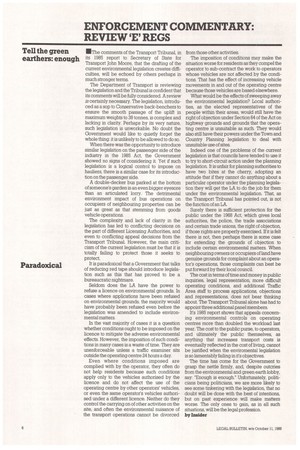Tell the green earthers: enough
Page 62

If you've noticed an error in this article please click here to report it so we can fix it.
EThe comments of the Transport Tribunal, in its 1985 report to Secretary of State for Transport John Moore, that the drafting of the current environmental legislation creates difficulties, will be echoed by others perhaps in much stronger terms.
The Department of Transport is reviewing the legislation and the Tribunal is confident that its comments will be fully considered. A review is certainly necessary. The legislation, introduced as a sop to Conservative back-benchers to ensure the smooth passage of the uplift in maximum weights to 38 tonnes, is complex and Jacking in clarity. Perhaps by its very nature, such legislation is unworkable. No doubt the Government would like to quietly forget the whole thing: it is unlikely to be allowed to do so. When there was the opportunity to introduce similar legislation on the passenger side of the industry in the 1985 Act, the Government showed no signs of considering it. Yet if such legislation is a logical control to impose on hauliers, there is a similar case for its introduction on the passenger side.
A double-decker bus parked at the bottom of someone's garden is an even bigger eyesore than an articulated lorry. The detrimental environment impact of bus operations on occupiers of neighbouring properties can be just as great as that stemming from goods vehicle operations.
The complexity and lack of clarity in the legislation has led to conflicting decisions on the part of different Licensing Authorities, and even to conflicting appeal decisions from the Transport Tribunal. However, the main criti cism of the current legislation must be that it is totally failing to protect those it seeks to protect.
It is paradoxical that a Government that talks of reducing red tape should introduce legislation such as this that has proved to be a bureaucratic nightmare.
Seldom does the LA have the power to refuse a licence on environmental grounds. In cases where applications have been refused on environmental grounds, the majority would have probably been refused even before the legislation was amended to include environmental matters.
In the vast majority of cases it is a question whether conditions ought to be imposed on the licence to mitigate the adverse environmental effects. However, the imposition of such conchtons in many cases is a waste of time. They are unenforceable unless a traffic examiner sits outside the operating centre 24 hours a day.
Even where conditions imposed are complied with by the operator, they often do not help residents because such conditions apply only to the vehicles authorised by the licence and do not affect the use of the operating centre by other operators' vehicles, or even the same operator's vehicles authorised under a different licence. Neither do they control the carrying on of other activities on the site, and often the environmental nuisance of the transport operations cannot be divorced from those other activities.
The imposition of conditions may make the situation worse for residents as they compel the operator to sub-contract the work to operators whose vehicles are not affected by the conditions. That has the effect of increasing vehicle movements in and out of the operating centre because those vehicles are based elsewhere.
What would be the effects of sweeping away the environmental legislation? Local authorities, as the elected representatives of the people within their areas, would still have the right of objection under Section 64 of the Act on highway grounds and grounds that the operating centre is unsuitable as such They would also still have their powers under the Town and Country Planning legislation to deal with unsuitable use of sites.
Indeed one of the problems of the current legislation is that councils have tended to use it to try to short-circuit action under the planning legislation. It is unfair for planning authorities to have two bites at the cherry, adopting an attitude that if they cannot do anything about a particular operator under the planning legislation they will get the LA to do the job for them under the environmental legislation. That, as the Transport Tribunal has pointed out, is not the function of an LA.
Surely there is sufficient protection for the public under the 1968 Act, which gives local authorities, the police, the trade associations and certain trade unions, the right of objection, if those rights are properly exercised If it is felt there is not, then perhaps there is some case for extending the grounds of objection to include certain environmental matters. When neighbouring owners or occupiers of land have genuine grounds for complaint about an operator's operations, those complaints can best be put forward by their local council.
The cost in terms of time and money in public inquiries, legal representation, more difficult operating conditions, and additional Traffic Area staff to process applications, objections and representations, does not bear thinking about. The Transport Tribunal alone has had to appoint three additional panel members.
It's 1985 report shows that appeals concerning environmental controls on operating centres more than doubled the workload last year. The cost to the public purse, to operators, and ultimately the public themselves, as anything that increases transport costs is eventually reflected in the cost of living, cannot be justified when the enviromental legislation is so lamentably failing in it's objectives.
The time has come for the Government to grasp the nettle firmly, and, despite outcries from the environmental and green earth lobby, say: "Enough is enough." Unfortunately, politicians being politicians, we are more likely to see some tinkering with the legislation, that no doubt will be done with the best of intentions, but on past experience will make matters worse. The only ones to gain, as in all such situations, will be the legal profession.
by Insides
























































































































